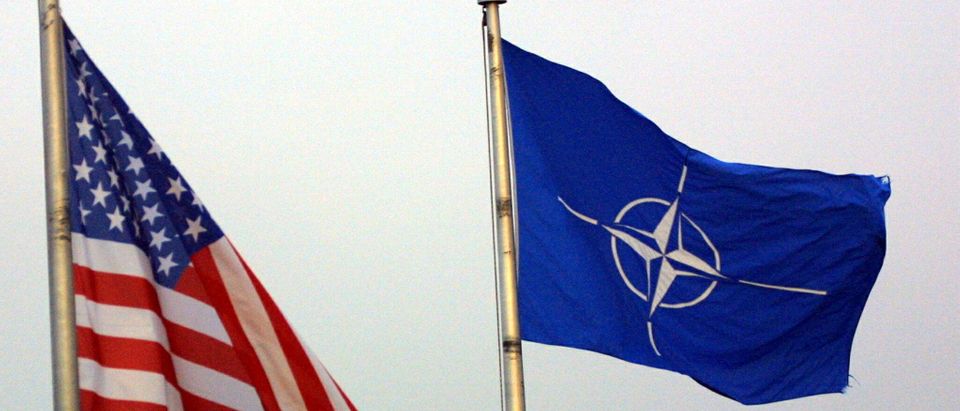Editor’s note: We endeavor to bring you the top voices on current events representing a range of perspectives. Below is a column arguing that NATO’s mobilization over the Ukraine crisis is an effective way to deter Russia from pushing its claims. You can find a counterpoint here, where William Ruger of Defense Priorities argues that it is a dangerous overreach and makes war more likely.
How can the West best counter Russian aggression? That’s the central question in the current standoff with the Kremlin over Ukraine, in which the threat of a Russian invasion is both real and growing.
For weeks now, Russia has massed forces on its common border with neighboring Ukraine. The U.S. intelligence community has estimated that more than 100,000 troops are now poised along that boundary, setting off fears that a large-scale Russian military incursion might be in the offing in the near future.
It very well could be. At the outset, Russia’s deployment appeared designed primarily to elicit concessions from Europe and the United States from an extensive list of demands drawn up by the Kremlin to improve its security position on the continent. But, as time has dragged on, and amid a diplomatic impasse between Russia and the West, the possibility of a “hot war” in Europe has increased significantly.
The reason is clear. The longer the Kremlin keeps its forces in place, the higher the costs are to Russia itself. This is true both in practical terms (involving the care and feeding of a massive military contingent) and in reputational ones, since demobilizing without achieving concrete political or military objectives is likely to prove costly to Russian President Vladimir Putin. As a result, the United States and its Western allies are suddenly confronted with the very real possibility of something not seen for three-quarters of a century: a continental war in Europe.
Preventing such an eventuality is now an overriding priority in Washington and European capitals. How best to do so, however, remains the subject of heated debate. Faced with the prospects of a fresh military entanglement, some commentators have counseled that the U.S. should avoid conflict with Russia by any means necessary, including by allowing the Kremlin to invade and annex Ukraine if it has a mind to do so.
Such thinking, however, is deeply flawed, for a simple reason: the conflict over Ukraine isn’t just about Ukraine. It is instead a manifestation of Russia’s larger discontent with the contemporary geopolitical balance of power, and an attempt to alter it in its favor.
Such a revision has been a Russian objective for some time. Back in 2005, Russian President Vladimir Putin famously intoned that the collapse of the USSR represented the “greatest geopolitical catastrophe” of the 20th century. Since then, he has worked diligently to rectify this state of affairs. Russia’s leader has done so by recreating a modified version of the Soviet sphere of influence, complete with economic arrangements (like the Eurasian Economic Union) and security blocs (like the Collective Security Treaty Organization) that have Moscow at their center.
Ukraine holds a special place in those plans. A millennia ago, Kievan Rus (a territory encompassing modern day Ukraine, Belarus and parts of Russia) was the biggest state in Europe, and the place from which the Russian empire eventually sprang. Control of this territory is essential to the restoration of Russian imperial glory, which is why Russian ideologues so often reject the idea of an independent, sovereign Ukrainian nation.
But Ukraine isn’t really the main target of Russia’s present belligerence. Europe is. For officials in Moscow, who continue to view their country as a great power, the current, post-Cold War geopolitical status quo is deeply inequitable, while rampant political and social divisions in the United States and throughout Europe provide a particularly opportune time to change it. If they hope to deter Russia, Western nations will need to understand the Kremlin’s current designs on Ukraine for what they are: not simply a territorial dispute, as some have suggested, but the opening salvo in a larger effort by Moscow to redraw the European continent’s strategic map.
That, in turn, suggests a role for NATO. When the alliance was formed in 1949, in the aftermath of the Second World War, it was intended to provide collective security for the countries of Europe against the predations of an ideologically driven, expansionist Soviet Union. And for over four decades, until the Soviet collapse in 1991, it was singularly successful in that mission. Today, when Europe faces a renewed threat from a revanchist Russia, the alliance has again embraced this role through a mobilization of troops and prepositioning of assets.
These steps, it should be noted, aren’t being done in defense of Ukraine. Kyiv has not asked the United States or any other country to take up arms against Russia on its behalf, only to provide it with the military materiel that would allow it to better carry out the fight on its own. How much we should, and what assistance should be given, are different debates entirely – ones that are currently playing out in Washington and assorted European capitals.
Rather, NATO’s mobilization is designed to send several concrete messages to Moscow. The first is that the alliance stands ready to respond to Russian military adventurism, if necessary – an important signal at a time when adversaries elsewhere are likewise questioning Western resolve. Another is that the bloc is committed to the defense of vulnerable members in Eastern Europe (like Poland and Lithuania) whom the Kremlin might also come to covet in the not-so-distant future. Most importantly, however, the alliance is making it clear to Moscow that it is prepared to fight to prevent a rollback of the hard-won gains of the Cold War.
To stave off a wider war in Europe, those are messages worth sending.
Ilan Berman is Senior Vice President of the American Foreign Policy Council in Washington, DC.


